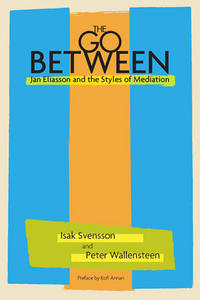The Go-Between: Jan Eliasson and the Styles of Mediation - Book Launch
The U.S. Institute of Peace invites you to celebrate the publication of “The Go-Between: Jan Eliasson and the Styles of Mediation,” a new book by Isak Svensson and Peter Wallensteen, with a preface by former U.N. Secretary-General Kofi Annan.
 Success in international mediation hinges on the skill, style and methods of the mediator. Yet, the role played by individual diplomats and the unique skills that make them successful are rarely explored. Further analysis of the role that mediators play in conflict resolution offers insight into the constraints mediators face and the outcomes they may achieve in other scenarios. What can current negotiators and diplomats learn from those who have come before them?
Success in international mediation hinges on the skill, style and methods of the mediator. Yet, the role played by individual diplomats and the unique skills that make them successful are rarely explored. Further analysis of the role that mediators play in conflict resolution offers insight into the constraints mediators face and the outcomes they may achieve in other scenarios. What can current negotiators and diplomats learn from those who have come before them?
The U.S. Institute of Peace invites you to celebrate the publication of “The Go-Between: Jan Eliasson and the Styles of Mediation,” a new book by Isak Svensson and Peter Wallensteen, with a preface by former U.N. Secretary-General Kofi Annan. This new book explores international mediation through the lens of Ambassador Jan Eliasson, an international go-between with a remarkable track record in Sudan, Burma/Myanmar and numerous other conflict zones.
Speakers:
- Richard H. Solomon, Introduction
President, U.S. Institute of Peace - Amb. Teresita C. Schaffer, Panelist
Director, South Asia Progra, CSIS
Former U.S. Ambassador to Sri Lanka -
Peter Wallensteen, PanelistAuthor, "The Go-Between: Jan Eliasson and the Styles of Mediation."Dag Hammarskjöld Professor of Peace and Conflict Research, Uppsala University and Richard G. Starmann Senior Research Professor of Peace Studies at Kroc Institute for International Peace Studies, University of Notre Dame
- Pamela Aall, Moderator
Provost, Academy for International Conflict Management & Peacebuilding,
U.S. Institute of Peace
Explore Further
- Read about "The Go-Between: Jan Eliasson and the Styles of Mediation."



